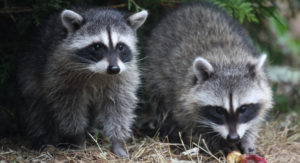
BARNSTABLE – Ever since the discovery of the first rabies-infected raccoon on Cape Cod in eight years earlier this season, the Cape Cod and Southeast Massachusetts Rabies Task Force has been working to spread animal vaccines and track down any more infected animals.
During the campaign, over 700 different raccoons were captured alive and unharmed, vaccinated against rabies, then released back into the wild with a tag.
“So far, knock on wood, we’ve only had that one case,” said task force coordinator Brian Bjorklund.
Oral rabies vaccine baits were also released across Cape Cod from the canal to Orleans by air in mid-July, with a plan to repeat the dispersal effort beginning September 13.
The aerial operation beginning September 13 is expected to last approximately eight days, weather permitting, and will utilize two low-flying helicopters.
Ground operations will also be carried out by town, county and federal employees as well as volunteers beginning September 20, which will continue for up to two weeks.
Bjorklund said that September usually sees a dispersal of ORV baits, but mostly on the mainland side of the Cape Cod Canal.
“Due to that emergency event, we added the entire Cape section once again, the same area we baited this past July. Essentially we’ll be baiting from Lakeville to Orleans and encompassing all the towns in between.”
Cape towns that will be part of the bait dispersal include Bourne, Sandwich, Falmouth, Mashpee, Barnstable, Yarmouth, Dennis, Brewster, Harwich, Chatham and Orleans.
With a plan to disperse roughly 156,000 oral vaccines across Cape Cod and parts of the mainland, the bait program will be the largest conducted by the task force since the inception of the Cape Cod Rabies Program in 1994.
Officials with the task force urged the public to leave the baits undisturbed should they encounter them and never relocate any wildlife, as it may spread disease.
If contact with a bait occurs, individuals are urged by the task force to rinse the area with warm water and soap and call (877) 722 6725.
The baits are non-toxic to pets, but may cause upset stomachs if ingested.























